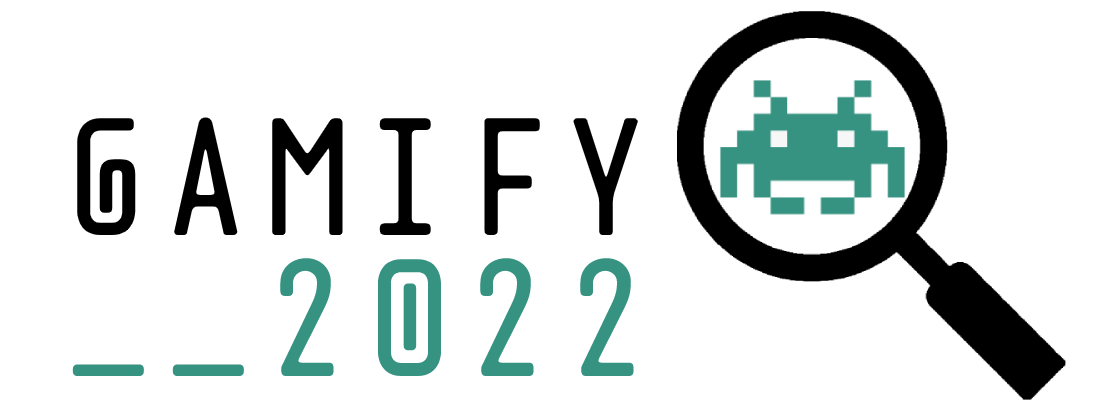// About
Gamify2022 will be the first edition of the international workshop on Gamification in Software Development, Verification, and Validation.
Gamification is the practice of applying game-like mechanics to increase the engagement and fun in non-ludic activities. Gamification usually involves elements such as leaderboards, achievements, missions, and competitions between players. Evidence in Software Engineering literature demonstrates that gamification can improve software quality when applied to most phases of the software process. Gamify aims at investigating the current trends in the development of source code, and in the generation of test scenarios that leverage Gamified mechanics.
The workshop aims at bringing together researchers, practitioners and tool developers working on topics related to the application of such gamified mechanics to software development, verification and validation. The workshop will aim including both academic and empirical research, as well as presentations of gamified tools and industrial case studies.
// Venue
The workshop will be held in Singapore: November 17, 2022. Co-located with ESEC/FSE 2022
The workshop will be hybrid - online presentations will be possible.
// Accepted Papers
- Giacomo Garaccione, Tommaso Fulcini, Marco Torchiano: GERRY - A Gamified Browser Tool for GUI Testing
- Casimer DeCusatis, Erin Alvarico, Omar Dirahoui: Gamification of Cybersecurity Training
- Savas Ozturk: Gamification of Exploratory Testing Process
// Program
- 14:00 - 14:10 - Opening by organizers
- 14:10 - 15:10 - Keynote: Gamifying Software Testing (Speaker: Gordon Fraser)
-
15:10 - 15:30 - Paper presentation: GERRY - A Gamified Browser Tool for GUI Testing (Speaker: Tommaso Fulcini)
-
15:30 - 16:00 - Break
- 16:00 - 16:20 - Paper presentation: Gamification of Cybersecurity Training (Speaker: Casimer DeCusatis)
- 16:20 - 16:40 - Paper presentation: Gamification of Exploratory Testing Process (Speaker: Savas Ozturk)
- 16:40 - 17:30 - Workshop activity: imagining a gamified development environment
// Organizers
- Riccardo Coppola - Politecnico di Torino, Turin (Italy)
- Luca Ardito - Politecnico di Torino, Turin (Italy)
- Mirna Muñoz - Centro de Investigación en Matemáticas A.C. Zacatecas Unit, Zacatecas (Mexico)
- Maurizio Leotta - University of Genova, Genova (Italy)
// Keynote: Gamifying Software Testing
Writing good software tests is difficult and not every developer’s favourite occupation. If an activity is so difficult, boring, or otherwise unattractive that people do not want to engage with it, then gamification offers a solution: By turning the activity into a fun and competitive task, participants engage, compete, and excel. In this talk, I will explore how this idea can be integrated into software testing tools (e.g. IDEs), processes (e.g. continuous integration), and education. Our experiences with gamified testing illustrate the potential of using gamification to address some of the many problems that we are facing today in software testing. There are, however, many challenges ahead, and I will outline some of the challenges and research opportunities related to gamifying software testing.
Gordon Fraser is a full professor in Computer Science at the University of Passau, Germany. He received a PhD in computer science from Graz University of Technology, Austria, in 2007, worked as a post-doc at Saarland University, and was a Senior Lecturer at the University of Sheffield, UK. The central theme of his research is improving software quality, and his recent research concerns the prevention, detection, and removal of defects in software.
// Important dates
- Workshop papers submission: July 31, 2022
- Workshop papers notification: August 31, 2022
- Workshop papers camera-ready (hard): September 9, 2022
- Workshop date: November 17, 2022
// Program Committee
- Andreas Bauer - Blekinge Institute of Technology, Sweden
- Antonio Bucchiarone - Bruno Kessler Foundation, Italy
- Beatriz Marin - Universitat Poltecnica de Valencia, Spain
- Filippo Ricca - Università degli Studi di Genova, Italy
- Francesco Strada - Politecnico di Torino, Italy
- João Henrique C. Pimentel - Universidade Federal Rural de Pernambuco, Brazil
- Marco Torchiano - Politecnico di Torino, Italy
- Michel Nass - Blekinge Institute of Technology, Sweden
- Pekka Aho - Open Universiteit, The Netherlands
- Tanja E.J. Vos - Open Universiteit, The Netherlands and Universitat Poltecnica de Valencia, Spain
- Tommaso Fulcini - Politecnico di Torino, Italy
// Call for Papers
Authors are invited to submit papers to the workshop, and present and discuss them at the event on topics related to Gamification in Software Development, Verification and Validation. Paper submissions can be of the following types:
- Full papers (max. 8 pages) describing original, complete, and validated research;
- Position/Short papers (max. 4 pages) that describe not fully validated, in-progress works, or that discuss potential new directions for the community;
- Tool papers (max. 4 pages) for researchers who want to present tools relevant to the workshop.
Relevant topics include:
- Gamified software development;
- Gamified definition of test cases/suites;
- Gamified end-2-end, capture & replay or exploratory testing;
- Gamified integrated development environments;
- Theoretical gamification frameworks;
- Metric frameworks to evaluate the performance of software developers and testers;
- Gamification applied to software development and software testing education;
- Applied games for software development and software testing education.
All submissions must be in English and in PDF format. At the time of submission, all papers must conform to the ESEC/FSE 2022 Format and Submission Guidelines. Gamify 2022 will employ a single-blind review process.
Each paper will be reviewed by at least three program committee members.
Accepted papers will be published as part of ESEC/FSE workshops proceedings, through the ACM Digital Library.
Papers should be submitted through HotCrp: Submission website.
